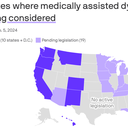More states are considering bills allowing medically assisted death this year

A push to let physicians prescribe life-ending drugs to terminally ill patients is getting major attention in statehouses this year, with lawmakers in 19 states considering bills to allow the practice.
The big picture: Despite continuing skepticism from the medical establishment, the controversial policy is gaining new momentum because of personal anecdotes, experience from states that were among the first to allow it, and changing attitudes partly driven by the pandemic's devastation.
- States considering legislation are as varied as Florida, Massachusetts, Tennessee and Virginia (where the Senate may vote on it as soon as Friday).
These bills typically allow people with six months or less to live to request prescriptions from a doctor that they can take at home if and when they decide to end their lives. Doctors can only prescribe the drugs to patients they deem mentally competent.
- Advocates say the practice brings humanity and dignity to death, but opponents say it's at odds with physicians' responsibility to care for patients and can open the door to more suicide.
- Oregon became the first state to legalize medically assisted death in 1994. Since then, nine states and Washington, D.C., have passed similar laws.
- Some patients, families and advocates object to the practice being called medically assisted suicide and prefer the term "medical aid in dying."
- Most, but not all, patients who receive a prescription ultimately use the medication to end their lives.
- About 5,330 people in the U.S. died with medical assistance as of 2020, and 8,451 received a prescription for the drugs, according to a study in the Journal of the American Geriatrics Society.
- The vast majority of patients who ended their lives were non-Hispanic white people (95.6%), and about three-quarters had a cancer diagnosis.
What they're saying: People watching their loved ones spend their final days in the hospital during COVID-19 without getting to say goodbye put a spotlight on the importance of the circumstances around a person's death, advocates say.
- "You have that very vivid reality in people's minds that how one dies matters," said Kim Callinan, president of advocacy group Compassion and Choices.
- America's growing senior population is also shifting the debate, she said.
- "As the baby boomers are retiring, the population of people that are older or wanting different options at the end of life — it's an issue whose time has come," Callinan added.
Where things stand: It's not yet clear which states may legalize the practice this year, and in some states similar bills have failed to advance in past sessions.
- Advocates are most closely watching legislation in Maryland, Massachusetts, New York, Minnesota and Virginia, where lawmakers have previously weighed the idea.
- "We have momentum like we haven't seen since the bill was first introduced close to a decade ago," New York state Sen. Brad Hoylman-Sigal (D) told Axios.
- The New York State Bar Association's support of legislation for the first time this year was seen as a crucial endorsement.
Diane Kraus, a Maryland resident who has metastatic breast cancer, has been advocating for her state to pass legislation.
- "I want to have a big party, so all my friends can visit me," Kraus said. "And then they can say goodbye and have a realization that I'm not just ending early, but [that] it's OK."
- Kraus spent about 25 years working as an occupational therapist in home care and hospice settings. Hospice care provided at the end of a patient's life is a crucial service, she said, but "it can't solve everything."
The other side: Major medical associations have not endorsed medically assisted death.
- The American Medical Association's code of ethics opposes the practice, saying that "permitting physicians to engage in assisted suicide would ultimately cause more harm than good."
- However, in a nod to state laws allowing medically assisted death, the code in recent years was updated to affirm physicians' rights to exercise their own conscience "without violating their professional obligations."
- Other medical associations, including the American Academy of Family Physicians, are neutral on the practice.
- Tim Millea, who chairs the Catholic Medical Association's conscience rights task force, says medically assisted death runs counter to both his faith and his work as a physician.
- "To say that you have spent all this money, all this effort, all these sleepless nights, all this time training yourself, and the best you can do is kill somebody?" he said. "Any physician should be insulted by that."
- Lachlan Forrow, a doctor and a senior fellow at the Harvard Center for Bioethics, said states should proceed with caution.
- While he supports allowing terminally ill people the option to access medically assisted death, he said states must improve their palliative and end-of-life care services so nobody chooses it because their other options are inadequate.